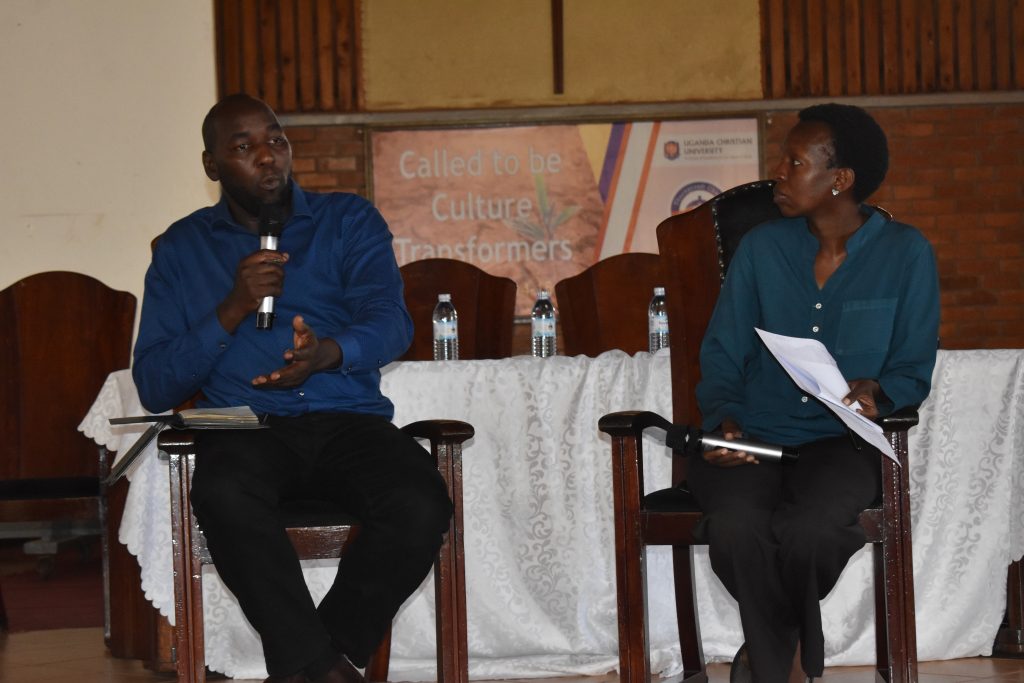By Christiana Ampeire & Photos by Laura Cenge
Senior Ugandan journalists representing the prestigious World Association of Newspaper and News Publishers (WAN-IFRA) passionately appealed to Uganda Christian University (UCU) journalism, media, and communication students to embrace the responsibility of upholding the journalism profession in a thought-provoking session. This happened in Nkoyoyo Hall during an open dialogue interface.
Encouraging them to carry the torch forward, these seasoned professionals emphasised the crucial role of the younger generation in preserving the integrity and vitality of the field. With unwavering determination, they urged the students to rise and seize the opportunities presented by the evolving media landscape. This inspiring call to action serves as a rallying cry, empowering aspiring journalists to forge ahead and make a lasting impact in the ever-changing world of journalism.
Ismail Ladu, a senior business, finance, and economy writer with Nation Media Group, congratulated the students on their decision to pursue a good profession. Despite some obstacles in establishing himself in the business, he said his passion for journalism has kept him in the newsroom.
“It’s challenging to get your bearings in the newsroom. To be closer to my internship station, I had to move from my parents’ house to a nearby relative’s house. The newsroom has to trust and know you in order to understand who you are, even though you were asked to cover a story that was fairly far from home and required the use of your own money,” explained Ladu.

However, he told the students that technology has brought a unique and convenient approach to journalism today. The journalists are currently operating in line with new trends like multimedia journalism. “It’s a good thing that UCU is training the upcoming journalists with a multimedia touch,” added Laddu.
Carolyne Nakazibwe, a content producer for The Observer, informed the students that journalism is a dynamic profession that may lead to a variety of opportunities. “We’ve traveled the world to cover stories, killing two birds with one stone: touring and working,” Nakazibwe explained.
She also stated that journalism can lead to other careers such as human resource management. She stressed that sexual harassment is still a major issue in the media, but she noted that, based on her own experience, rejecting these advances will still get your article published.
She further stated that their combined efforts to combat the vice of sexual harassment had been successful and urged students to coordinate their efforts to combat the vice in the newsroom.
“Sexual harassment is a problem, and I’m glad we confronted it back then. We started a trend that was successful’m glad we confronted it back then.” We started a trend that was successful. When necessary, speak up for yourself and report,” said Nakazibwe.
Irene Abalo, a reporter with Nation Media Group, also urged students to create boundaries as journalists because doing so helps to define limits in the profession. She acknowledged that it was impossible to please everyone.
Kefa Ssenoga, a student pursuing journalism who also doubles as the president of the Media Link Association, has appreciated WAN-IFRA for sharing their field experience with the aspiring journalists.
“I believe the students got an honest and real conversation from the practitioners who are already experienced; in other words, there was a lot in stock for the students to take home in terms of knowledge,” said Ssenoga.
Professor Monica Chibita expressed gratitude to the WAN-IFRA for this initiative to speak aspiring journalists.
She also emphasised that the journalism school wants to bridge the gap between the classroom and the newsroom.


